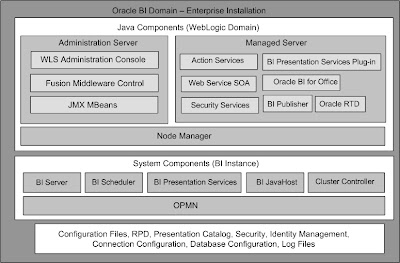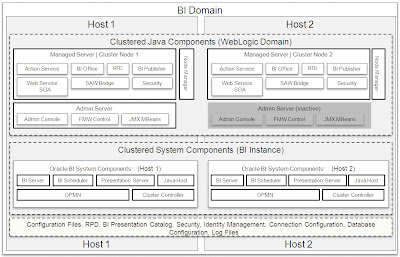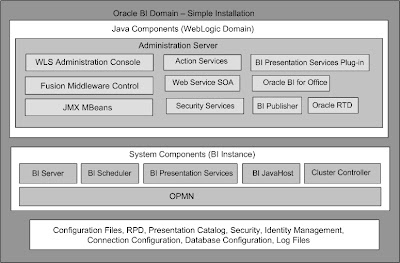OBIEE 11g Architecture is shown in the below two pictures. This pictures are taken from Oracle Document and shown here for reference.
This Architecture shows all the component of OBIEE with Enterprise Installation.
Oracle Business Intelligence system architecture on a single-host

Oracle Business Intelligence System Logical Architecture (Two Hosts)



Oracle Business Intelligence System Logical Architecture (Two Hosts)

About
Java Components:
Java
components are deployed as one or more Java EE applications and are
described in the following list:
Administrative
Components —
Oracle WebLogic Server Administration Console, Fusion Middleware Control,
and JMX MBeans for managing all configuration and run-time settings for
Oracle Business Intelligence.
Oracle
BI Publisher — This
component provides an enterprise reporting solution for authoring,
managing, and delivering all types of highly formatted documents to
employees, customers, and suppliers
Oracle
BI for Microsoft Office — This
component provides the integration between Oracle Business Intelligence
and Microsoft Office products.
Oracle
BI Action Services — This
component provides the dedicated Web services that are required by the
Action Framework and that enable an administrator to manually configure
which Web service directories can be browsed by users when they create
actions.
Oracle
Real-Time Decisions (Oracle RTD) — This
component provides enterprise analytics software solutions that enable
companies to make better decisions in real time at key, high-value points
in operational business processes.
Oracle
BI Security Services — This
component provides dedicated Web services that enable the integration of
the Oracle BI Server with the Oracle Fusion Middleware security platform.
Oracle
BI SOA Services — This
component provides dedicated Web services for objects in the Oracle BI
Presentation Catalog, to invoke analyses, agents, and conditions. These
services make it easy to invoke Oracle Business Intelligence functionality
from Business Process Execution Language (BPEL) processes.
Oracle
BI Presentation Services Plug-in — This
component is a JEE application that routes HTTP and SOAP requests to
Oracle BI Presentation Services.
About
BI System Components:
System
components are deployed as non-JEE components, such as processes
and services written in C++ and J2SE, and are described in the following
list:
Oracle
BI Server — This
component provides the query and data access capabilities at the heart of
Oracle Business Intelligence and provides services for accessing and
managing the enterprise semantic model (stored in a file with an .RPD
extension).
Oracle
BI Presentation Services — This
component provides the framework and interface for the presentation of
business intelligence data to Web clients. It maintains an Oracle BI
Presentation Catalog service on the file system for the customization of
this presentation framework.
Oracle
BI Scheduler — This
component provides extensible scheduling foranalyses to be delivered to users
at specified times. (Oracle BI Publisher has itsown scheduler.)
Oracle
BI JavaHost — This
component provides component services that enable Oracle BI Presentation
Services to support various components such as Java tasks for Oracle BI
Scheduler, Oracle BI Publisher, and graph generation. It also
enables Oracle BI Server query access to Hyperion Financial Management and
Oracle OLAP data sources.
Oracle
BI Cluster Controller — This
component distributes requests to the BI Server, ensuring requests are
evenly load-balanced across all BI Server process instances in the BI
domain.
BI System Architecture - Single host and Simple Install:
The architecture for the Simple Install type is similar to that of the Enterprise Install type, with the differences that are outlined in the following list:
1. The Node Manager is not installed.
2. All components that are part of the Managed Server in an Enterprise Install type are
instead part of the Administration Server. The Managed Server is not installed.
The architecture for the Simple Install type is similar to that of the Enterprise Install type, with the differences that are outlined in the following list:
1. The Node Manager is not installed.
2. All components that are part of the Managed Server in an Enterprise Install type are
instead part of the Administration Server. The Managed Server is not installed.
